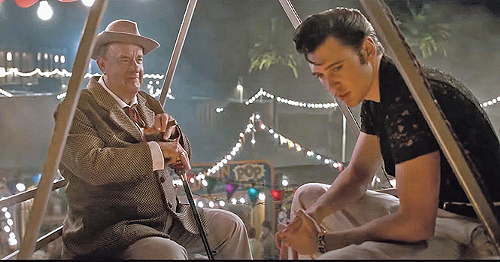The King and Ay-yi-yi
Elvis exemplifies Baz Luhrmann's tendency toward unfocused emotionalism.
By Scott Renshaw @scottrenshawAfter more than 20 years of writing about Baz Luhrmann—Moulin Rouge! was the first review I ever wrote for this publication—it remains clear that nearly everything that drives me nuts about his movies are things he would consider features, not bugs. He doesn't particularly care about narrative detail, even if he's working from established classics like Romeo & Juliet or The Great Gatsby. His cinematic canvases are all about big emotions and iconography.
Elvis Presley seems like an ideal subject for someone with those particular artistic inclinations, and Luhrmann dives into Elvis with the enthusiasm of someone who believes he has something new and compelling to say about one of the most famous and well-chronicled humans of the 20th century. But after more than two and a half hours of Elvis, I still have no idea exactly what that something was supposed to be.
Did he intend this primarily as a profile of Presley's controversial manager, Col. Tom Parker (Tom Hanks)? Did he want to rehabilitate Presley's history as an appropriator of Black American music by turning him into its champion? Did he just want to bring his particular style to a conventional "greatest hits" musical biopic? And would it surprise me at all if he thought he could somehow do all of those things at once?
Lurhmann and his screenwriting team—including longtime collaborator Craig Pearce—begin with Parker on his deathbed in Las Vegas circa 1997, beginning to narrate to the audience about his life and history with Elvis (Austin Butler). The flashbacks then ensue, as Parker learns about the growing popularity of the young singer who is folding blues and gospel music into traditional country, but—as Parker says, with dollar signs practically visible in his eyes—"he's white!"
The entire arc of Presley's musical career then unfolds, from his rapid rise to fame, the growing controversy surrounding his sexualized (and possibly miscegenation-encouraging) stage presence, his lucrative but artistically unfulfilling movie career, and his third act as a living legend in Las Vegas while disintegrating into addiction.
The material focusing on Col. Tom Parker certainly holds the most potential for discovery, and Elvis offers an interesting context of Parker as a savvy, carnival-trained con artist. It's kind of hard to dig into that stuff, however, since Hanks' performance is ... let's just say, not among his best.
Buried under prosthetic makeup and a fat suit, while adopting a vaguely Dutch accent that may be true to Parker's actual speech but doesn't do the performance any favors, Hanks' Parker reads cartoonish. The potential drama of watching Parker sabotage Elvis' dreams of a European tour by steering him for self-serving reasons into staying on in Vegas gets undercut when the character feels like a Mike Myers Austin Powers creation played deadly straight.
It doesn't help that the idea of framing this story from Parker's point of view keeps vanishing whenever it's inconvenient to Luhrmann's desires at any given moment, like showing us scenes from the courtship between Elvis and Priscilla (Olivia DeJonge). That's when Elvis starts to feel like exactly the kind of movie Walk Hard was mocking—almost too literally at some points, like the early scene where an Elvis live performance immediately turns the girls in the audience into uncontrollable nymphomaniacs.
The attempts at character insight—and Butler's gentle, inward-looking performance as Elvis—get swallowed up by Luhrmann ticking off a checklist of tidbits from the Elvis mythology, like "Elvis has left the building," or shooting out television sets. This is an epic-length movie in which a lot happens, but not nearly enough of it feels pivotal.
Then there's the matter of Elvis as racially-conscious deliverer of Black culture to the masses, and frankly, I don't feel remotely qualified to speak to the historical authenticity of stuff like his friendship with B.B. King (Kelvin Harrison Jr.) or his deep respect for Black church music. I just know how it feels, and it feels ... kind of icky. Luhrmann just keeps packing on material about Elvis reacting to Martin Luther King, Jr.'s assassination, or missing Mahalia Jackson's funeral, that takes on a "methinks he doth protest too much" vibe.
He wants us to feel things about Elvis—that he was a good man, that his artistic potential was hindered by Parker's manipulations, and so on. He wants us to feel. Luhrmann always wants us to feel. And all I keep feeling is, "Come on, man, pull all of this stuff together."
More by Scott Renshaw
-
Film Reviews: New Releases for April 12
Civil War, Escape from Germany, Coup de Chance, Hundreds of Beavers, La Chimera, Sting
- Apr 11, 2024
-
University of Utah School of Music premiere of A.L.I.C.E.
Composer connects the Lewis Carroll story to her experience living with autism
- Apr 10, 2024
-
Beavers and Spiders and Thieves, Oh My
Three new films cover a wide range of styles.
- Apr 10, 2024
- More »
Latest in Film Reviews
Readers also liked…
-
Power Plays
Two satirical comedies explore manipulations and self-delusions by those with power.
- Aug 31, 2022




